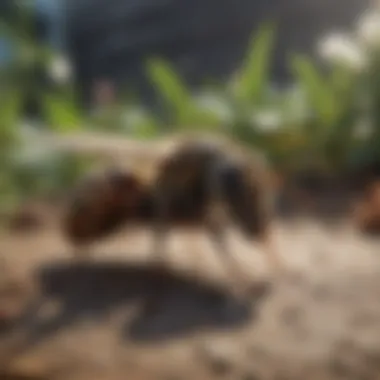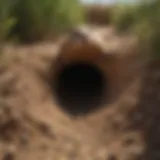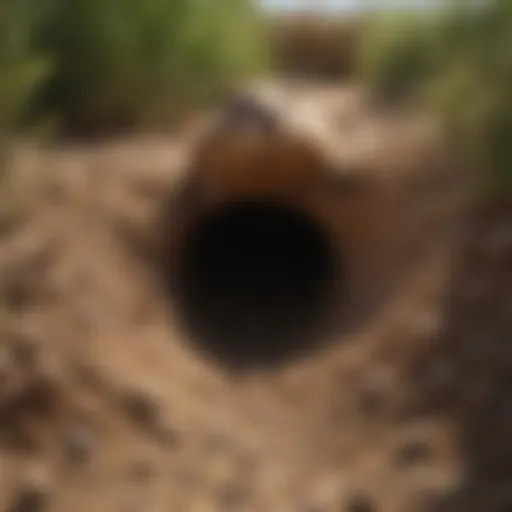Effective Strategies for Eliminating Ground Hornets Safely and Efficiently


Preventive Pest Control Strategies
When it comes to effectively managing and eliminating ground hornets from your property, implementing preventive pest control strategies is crucial. These proactive measures not only help in deterring hornets but also contribute to maintaining a pest-free environment overall. Let's delve into key areas that housewives can focus on to prevent and control pest infestations.
House Exterior Protection
Protecting the exterior of your house is the first line of defense against ground hornets. By sealing cracks and crevices around windows, doors, and foundations, you can reduce entry points for these pests. Moreover, clearing debris such as fallen leaves and wood piles around your property eliminates potential nesting sites for hornets. Taking these simple yet effective steps can go a long way in preventing hornets from entering your home.
Yard Maintenance
Maintaining your yard plays a significant role in pest control. Regular yard care routines like mowing the lawn, trimming shrubs, and removing standing water prevent hornets and other pests from establishing colonies near your home. Additionally, adopting methods such as planting pest-repelling plants can further deter ground hornets from nesting in your yard.
Indoor Cleanliness
Insects and pests are often attracted to areas with food residue and moisture. By practicing expert cleaning tips and techniques, such as regularly cleaning kitchen surfaces, wiping spills promptly, and fixing leaky pipes, you can help create a pest-resistant indoor environment. Consistent cleanliness is key to minimizing the appeal of your home to ground hornets.
Garbage Disposal
Proper waste disposal is essential in pest prevention. Implementing efficient garbage disposal methods, such as securing trash bins with tight-fitting lids and disposing of food waste properly, can discourage hornets from foraging for food near your property. Maintaining hygiene in waste management is paramount to reducing pest attraction.
Other Pest Prevention Strategies
In addition to the above measures, employing innovative ways to safeguard your home against pests is vital. Installing screens on windows and doors, using weather-stripping to seal gaps, and incorporating natural deterrents like citrus peels can all contribute to a comprehensive pest prevention strategy. Combining different tactics tailored to your property can enhance the effectiveness of your pest control efforts.
Understanding Ground Hornets
When it comes to understanding ground hornets, it is crucial to grasp the intricacies of their behavior and characteristics to effectively address infestations on your property. Ground hornets, scientifically known as Vespa crabro, are social insects that live in colonies underground. Identifying these hornets accurately is the first step in implementing successful elimination strategies.
Identification of Ground Hornets


Physical Characteristics
Ground hornets are distinguished by their large size, ranging from 10 to 25 mm in length, with a black and yellow striped abdomen. The most prominent physical feature of these insects is their robust build and powerful stinger. Understanding these physical traits is vital in differentiating them from other flying insects and gauging their potential threat level. While their size might be intimidating, it also makes them easier to spot and identify in your surroundings.
Nesting Behavior
Ground hornets exhibit distinct nesting behavior, with colonies establishing homes in abandoned rodent burrows or creating their underground tunnels. By comprehending their nesting patterns, such as preferring dark and sheltered areas for their hives, you can pinpoint potential nest locations on your property. Recognizing their nesting behavior aids in devising targeted removal methods that disrupt their living spaces, ultimately leading to effective hornet control.
Behavioral Patterns
Ground hornets display intricate behavioral patterns that influence their foraging habits and defensive reactions, shaping their interactions with humans and the environment.
Foraging Habits
Ground hornets are opportunistic hunters, preying on other insects for food sources. Their foraging habits revolve around identifying and capturing prey to sustain their colony's needs. Understanding their foraging routines involves recognizing peak activity times and preferred hunting grounds, facilitating the implementation of baiting and trapping strategies to lure them away from your property.
Defensive Reactions
When provoked or sensing a threat to their nest, ground hornets exhibit aggressive defensive reactions to protect their colony. Their stings contain venom that can cause painful reactions in individuals, warranting caution when approaching infested areas. By comprehending their defensive behaviors, such as swarming and stinging in response to perceived dangers, you can adopt preventive measures and safe removal techniques to minimize risks of encountering hornet attacks.
Natural Remedies for Ground Hornet Removal
When it comes to getting rid of ground hornets, using natural remedies can be an effective and environmentally friendly approach. In this section, we will delve into the importance of natural remedies for ground hornet removal within the context of this comprehensive guide. By focusing on specific elements, benefits, and considerations of natural remedies, readers will gain a deeper understanding of why these methods are valuable in managing ground hornet infestations.
Essential Oils and Plant Extracts
Peppermint Oil
Peppermint oil plays a crucial role in the realm of natural remedies for ground hornet removal. Its strong, minty aroma is a key characteristic that deters hornets, making it a popular choice for this article. The unique feature of peppermint oil lies in its ability to not only repel hornets but also mask scents that attract them. While peppermint oil is beneficial in deterring ground hornets, it may require frequent applications for sustained effectiveness, which could be considered a minor disadvantage.


Lemongrass Extract
Another essential component in natural hornet removal is lemongrass extract. Known for its citrusy scent, lemongrass extract is favored for its efficacy in repelling ground hornets. The key characteristic of lemongrass extract is its natural composition, making it a safe and environmentally friendly option for pest control. The unique feature of lemongrass extract lies in its versatility, as it not only repels hornets but also other insects. However, one potential disadvantage of lemongrass extract is that it may need to be reapplied periodically, depending on weather conditions and pest activity.
Homemade Traps and Baits
Homemade traps and baits offer another natural approach to dealing with ground hornets. They serve as effective tools for trapping and luring hornets away from your property. In this section, we will explore the specific aspects of sugar-water mixtures and vinegar solutions, highlighting their benefits, popularity, and considerations within the context of this article.
Sugar-Water Mixtures
Sugar-water mixtures are a cost-effective and simple homemade solution for trapping ground hornets. The key characteristic of sugar-water mixtures is their ability to attract hornets due to the sweet scent, making them a popular choice for hornet control. One unique feature of sugar-water mixtures is their versatility, as they can be easily customized with added ingredients to enhance attractiveness to hornets. However, a potential disadvantage of using sugar-water mixtures is the need for regular monitoring and maintenance to ensure continuous effectiveness.
Vinegar Solutions
Vinegar solutions are another effective homemade remedy for dealing with ground hornets. The key characteristic of vinegar solutions is their acidic nature, which repels hornets due to its strong scent. This makes vinegar solutions a popular choice for individuals seeking a natural and low-cost method of hornet control. One unique feature of vinegar solutions is their multipurpose use, as they can also deter other pests and insects. However, a possible disadvantage of vinegar solutions is that they may need to be reapplied more frequently compared to other remedies, depending on weather conditions and hornet activity levels.
Professional Pest Control Services
In the battle against ground hornets, utilizing professional pest control services can be a game-changer. These services offer specialized expertise and resources that can effectively rid your property of these pests. One of the specific elements that make professional pest control services crucial in this context is their ability to accurately assess the extent of the infestation. Through their training and experience, certified exterminators can identify the nesting sites and develop targeted strategies for eradication.
Moreover, professional intervention brings the benefit of utilizing industry-approved methods and insecticides. These professionals are equipped with the necessary tools to apply these substances safely and effectively, minimizing risks to both humans and the environment. Their expertise also extends to understanding the behavior of ground hornets, allowing them to choose the most appropriate eradication techniques.
When considering professional pest control services, one must weigh the cost considerations. Although it may incur expenses, the benefits far outweigh the financial aspect. The safety provided by expert handling of potentially harmful chemicals and the assurance of complete eradication justify the costs involved. Additionally, the time saved in managing the infestation and the long-term prevention of reoccurrence make it a worthwhile investment in maintaining a hornet-free environment.
Hiring Certified Exterminators
Benefits of Professional Intervention
Among the critical aspects of professional extermination services is the guarantee of a thorough and effective elimination process. Certified exterminators bring a level of expertise that ensures a detailed assessment of the situation, leading to targeted treatment plans. This precision not only eradicates existing ground hornets but also minimizes the chance of future infestations, offering a sustainable solution.


One of the key characteristics of professional intervention is the use of integrated pest management techniques. This holistic approach focuses on long-term prevention by addressing the root causes of infestations. By incorporating methods such as habitat modification and exclusion, certified exterminators ensure a comprehensive resolve to the hornet issue.
The unique feature of professional intervention lies in the customized solutions they provide. Each infestation is assessed individually, leading to tailored strategies that address specific needs. This personalized approach maximizes the effectiveness of the treatment while minimizing any adverse impacts on the surrounding environment.
Cost Considerations
When considering the cost of hiring certified exterminators, it is essential to view it as an investment in the safety and comfort of your home. While initial expenses may seem significant, the long-term benefits outweigh the financial outlay. Professional intervention not only eliminates current infestations but also reduces the likelihood of costly damages caused by prolonged hornet presence.
Moreover, the expertise and efficiency of certified exterminators lead to time savings and a higher quality of eradication. This translates to fewer re-treatments and follow-ups, resulting in a more cost-effective solution in the long run. Additionally, the peace of mind that comes with professional pest control services is invaluable, knowing that your property is effectively protected against ground hornets.
Chemical Treatments
Insecticide Sprays
Insecticide sprays play a vital role in the arsenal of pest control professionals when combating ground hornets. One specific aspect that makes insecticide sprays effective is their ability to quickly and directly target hornets present in visible nests. This targeted application ensures the swift elimination of these pests, reducing the risk of stings and property damage.
The key characteristic of insecticide sprays lies in their residual effect. Once applied, these substances create a protective barrier that deters ground hornets from re-establishing nests in treated areas. This long-lasting effectiveness contributes to the overall success of the eradication process, providing extended protection.
Dust Insecticides
Dust insecticides offer a unique approach to ground hornet control, especially in hard-to-reach or underground nesting sites. Their fine particles can penetrate crevices and voids where ground hornets typically build their hives, ensuring thorough coverage. This characteristic makes dust insecticides a preferred choice for targeting hidden or inaccessible nests.
The use of dust insecticides is beneficial due to their residual impact on ground hornets. As these pests come into contact with the treated surfaces, the insecticide particles adhere to their bodies, leading to transmission within the colony. This secondary kill effect expands the reach of the treatment, effectively eradicating the entire hornet population.
Preventive Measures for Ground Hornet Infestations
In this article, preventive measures for ground hornet infestations play a crucial role in ensuring a hornet-free environment. By implementing these measures, you not only tackle current infestations but also prevent future occurrences. The focus is on maintaining a safe and secure space for your household and surrounding area.
Landscaping Tips
- Removing Attractants: A key aspect of preventing ground hornet infestations is eliminating attractants that draw them to your property. This includes removing sources of food such as fallen fruits and open garbage cans. By minimizing accessible food, you make your space less appealing to hornets, reducing the chances of infestations. Removing attractants acts as a proactive measure to deter hornets from establishing nests on your property.
- Regular Maintenance: Regular maintenance of your property is essential in preventing ground hornet infestations. This involves keeping your outdoor space well-groomed, trimming overgrown vegetation, and maintaining a tidy environment. By staying on top of regular maintenance tasks, you reduce the harborage areas for hornets, making it less likely for them to settle in your surroundings. Consistent upkeep contributes significantly to discouraging hornets from nesting near your home.
Sealing Entry Points
- Holes and Cracks: Addressing holes and cracks around your property is integral to preventing ground hornet infestations. Seal any openings in walls, attics, and crawl spaces where hornets could potentially enter. By closing off these entry points, you create a barrier that restricts hornets' access to indoor spaces, reducing the risk of infestations. Properly maintaining and sealing holes and cracks serve as a proactive step towards fortifying your property against hornets.
- Utility Openings: Another critical aspect of preventing ground hornet infestations is securing utility openings. Ensure that vents, chimneys, and utility pipes are screened and sealed properly to prevent hornets from infiltrating through these entry points. By safeguarding utility openings, you not only deter hornets but also enhance the overall structural integrity of your property. Securing these areas plays a vital role in fortifying your home against hornet invasions.



